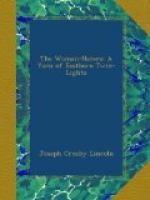He waded to the shore and strode rapidly back toward the boathouse. His companion called after him.
“I shall expect you to-morrow afternoon,” she said. “You’ve promised to teach me that side stroke, remember.”
Brown dressed in a great hurry and climbed the path to the lights at the double quick. All was safe and serene in the house, and he breathed more freely. Atkins was sound asleep, really asleep, in the bedroom, and when he emerged he was evidently quite unaware of his helper’s unpremeditated treason. Brown’s conscience pricked him, however, and he went to bed that night vowing over and over that he would be more careful thereafter. He would take care not to meet the Graham girl again. Having reached this decision, there remained nothing but to put her out of his mind entirely; which he succeeded in doing at a quarter after eleven, when he fell asleep. Even then she was not entirely absent, for he dreamed a ridiculous dream about her.
Next day he did not go for a swim, but remained in the house. Seth, at supper, demanded to know what ailed him.
“You’re as mum as the oldest inhabitant of a deaf and dumb asylum,” was the lightkeeper’s comment. “And ugly as a bull in fly time. What ails you?”
“Nothing.”
“Humph! better take somethin’ for it, seems to me. Little ’Stomach Balm,’ hey? No? Well, go to bed! Your room’s enough sight better’n your company just now.”
The helper’s ill nature was in evidence again at breakfast time. Seth endeavored to joke him out of it, but, not succeeding, and finding his best jokes received with groans instead of laughter, gave it up in disgust and retired. The young man cleared the table, piled the dishes in the sink, heated a kettleful of water and began the day’s drudgery, drudgery which he once thought was fun.
Why had he had the ill luck to fall overboard from that steamer. Or why didn’t he drown when he did fall overboard? Then he would have been comfortably dead, at all events. Why hadn’t he stayed in New York or Boston or somewhere and kept on trying for a position, for work—any kind of work? He might have starved while trying, but people who were starving were self-respecting, and when they met other people—for instance, sisters of fellows they used to know—had nothing to be ashamed of and needn’t lie—unless they wanted to. He was a common loafer, under a false name, down on a sandheap washing dishes. At this point he dropped one of the dishes—a plate—and broke it.
“D—n!” observed John Brown, under his breath, but with enthusiasm.
He stooped to pick up the fragments of the plate, and, rising once more to an erect position, found himself facing Miss Ruth Graham. She was standing in the doorway.
“Don’t mind me, please,” she said. “No doubt I should feel the same way if it were my plate.”
The young man’s first move, after recovery, was to make sure that the door between the kitchen and the hall leading to the lightkeeper’s bedroom was shut. It was, fortunately. The young lady watched him in silence, though her eyes were shining.




